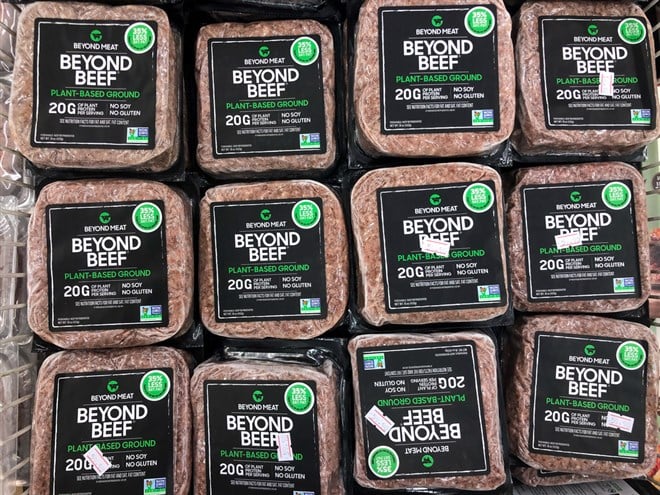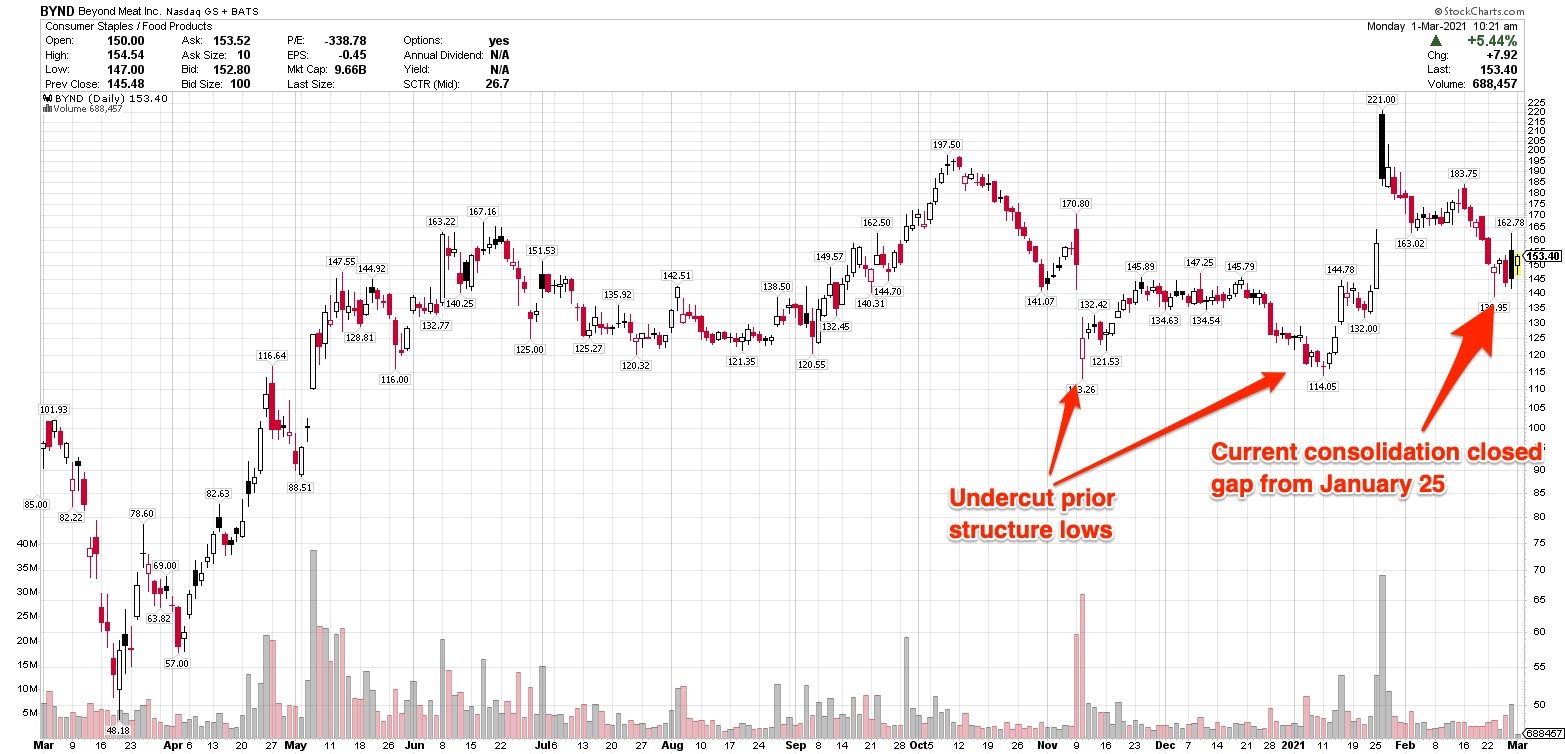 Beyond Meat NASDAQ: BYND
Beyond Meat NASDAQ: BYND, maker of plant-based meat alternatives, got a boost from its fourth-quarter earnings report, despite some disappointing results.
Investors cheered the company’s future growth prospects, based on deals with Yum Brands NYSE: YUM, McDonald’s NYSE: MCD and Pepsico NASDAQ: PEP, among others.
In its earnings conference call on February 25, Beyond Meat revealed details about its McDonald’s and Yum partnerships.
The company will supply plant-based proteins for the McPlant burger, currently being tested at McDonald’s locations in Denmark and Sweden. CEO Ethan Brown said Beyond Meat is collaborating with McDonald’s to develop substitutes for chicken, pork and egg.
Despite a pandemic-driven setback in the food service market, Beyond Meat proceeded with build-outs to its production infrastructure, anticipating a bounceback from lockdowns and a poor economy. Globally, the company invested in a production facility in China, and two in the Netherlands.
In the U.S., Beyond Meat acquired a production plant in Pennsylvania. It also signed a lease for a new corporate headquarters in Los Angeles and is building a state-of-the-art facility for its research laboratories.
“These investments and activities, particularly during this period of Covid-19 revenue disruption generated losses,” said Brown. “They were, however, non-negotiable as we lay the foundation for forward growth.”
For the fourth quarter, the company reported a loss of $0.34 per share on revenue of $101.9 million. That’s 4% year-over-year revenue growth, in stark contrast to triple-digit revenue growth in 2019, a reflection of the importance of the foodservice channel.
Brown cautioned against expecting fast results from the company’s infrastructure investments.
“I want to emphasize that due to the likely phasing of these notable partnerships, any activity is likely to skew toward the latter part of this year and, therefore, from a modeling perspective, the potential impact to Beyond Meat in 2021 is likely to be fairly modest,” he said.
Chief financial officer Mark Nelson added that retail net revenue increased 85% year over year, while foodservice net revenue decreased 54% vs. the fourth quarter of 2019.
Plant-based meat substitutes are rapidly growing in popularity throughout the globe. According to researcher Euromonitor, the European market for meat substitutes nearly doubled between 2014 and 2019.
Meanwhile, U.S. sales of plant-based foods grew faster than total food sales during the pandemic, according to data from the Plant Based Food Association, a San Francisco-based trade group.
In a May 2019 report from Barclays, analysts wrote that the global market for alternative meat could hit $140 billion by 2029.
Beyond Meat’s biggest competitor is Impossible Foods, which is currently privately held, but has raised significant venture capital, including $200 million in August 2020, led by New York-based Coatue Management. Other investors include Bill Gates, Google NASDAQ: GOOG Ventures, UBS Group NYSE: UBS and Khosla Ventures. Celebrity investors include Serena Williams, Katy Perry, Jay-Z and Trevor Noah.
In addition to Impossible Foods, rivals include traditional meat producer Tyson Foods NYSE: TSN; Kroger NYSE: KR; food-service supplier Sysco NYSE: SYY; Morning Star farms, owned by Kellogg NYSE: K; Gardein, owned by ConAgra Foods NYSE: CAG; and Sweet Earth Brand, owned by Nestle OTC: NSRGY.
Beyond Meat’s chart has been sloppy and prone to volatility since the stock’s public debut in May, 2019.
It broke out of its Covid-induced correction in May, and promptly began forming a cup-shaped base, which it cleared in October.
Uncertainty about prospects for a rebound of the food service sector, along with the broader economy, resulted in a new consolidation in mid-October. That pullback undercut previous structure lows in two legs down, one in November and another in January.

Beyond Meat is currently forming a price consolidation just above its 50-day moving average.
While that chart action may seem discouraging, it can actually be constructive in a growth stock, as it shakes out weak holders and sets the stage for new investors with more conviction to pick up shares at a lower price.
The stock vaulted 17.70% on January 26, on news of a lawsuit targeting Impossible Foods over its artificial “heme” product, designed to resemble blood in real meat.
It’s since retraced those gains and is forming another somewhat sloppy price consolidation above its 50-day moving average.
Before you consider Beyond Meat, you'll want to hear this.
MarketBeat keeps track of Wall Street's top-rated and best performing research analysts and the stocks they recommend to their clients on a daily basis. MarketBeat has identified the five stocks that top analysts are quietly whispering to their clients to buy now before the broader market catches on... and Beyond Meat wasn't on the list.
While Beyond Meat currently has a Sell rating among analysts, top-rated analysts believe these five stocks are better buys.
View The Five Stocks Here
Enter your email address and we'll send you MarketBeat's guide to investing in 5G and which 5G stocks show the most promise.
Get This Free Report